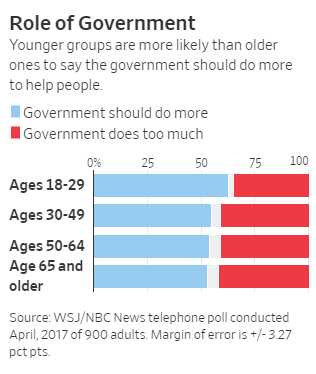Millennials want Socialism to 'Get Ahead'
Socialism continues to fail miserably in Venezuela, but America’s young people, evidently oblivious to what is going on in the world, believe they need more government and more socialism in their future. Millennials (age 18-34) don’t see what’s in it for them with capitalism.
“Maybe it had to do with the ‘American Dream,’ and how capitalism was correlated with it, but a lot of young people don’t believe in it anymore,” said Ana Garcia, a junior at the Elon event told the Wall Street Journal. “We don’t trust capitalism because we don’t see ourselves getting ahead.”
Ms. Garcia should have a look at Venezuela where socialism is starving its population. Three of every four people lost weight last year in a country that was once the fourth-richest per-capita in the world.
Rich Lowry writes for the NY Post,
A country that has more oil reserves than Saudi Arabia is suffering shortages of basic supplies. Venezuela now totters on the brink of bankruptcy and civil war, in the national catastrophe known as the Bolivarian Revolution.
Meanwhile, a Gallup poll shows that over 50 percent of Americans 18 to 29 support socialism. Over 30 percent of those 30-49 have a positive view of socialism. The percentage drops to slightly over 25 percent for those 50-64, and slightly under 25 percent for those 65 and over.
Grace Magness says, “socialism has gotten less spooky; it’s no longer associated with communism the way it was,” adding “straight-up capitalism seems like it has a lot of potential to be really corrupt.”
Of course, you may say young people have always tended to lean toward socialism until they grow up, start paying taxes, and having kids. However, past a certain age people’s opinions are very hard, if not impossible, to change.
Lowrey lists the effects socialism or communism is having in Venezuela,
The Chavistas have worked from the typical Communist playbook of romanticizing the masses while immiserating them. Runaway spending, price controls, nationalization of companies, corruption and the end of the rule of law — it’s been a master class in how to destroy an economy.
The result is a sharp, yearslong recession, runaway inflation and unsustainable debt. The suffering of ordinary people is staggering, while the thieves and killers who are Chavista officials have made off with hundreds of billions of dollars. At this rate — The Economist calls the country’s economic decline “the steepest in modern Latin American history” — there will be nothing left to steal.
While it’s clear what has gone wrong in Venezuela, Ryan Beitler doesn’t buy it, he claims, “socialist ideas are not what has led the country to starvation and commodity shortages like many in the United States suggest,” but corruption.
Beitler continues,
Under Hugo Chavez, there were significant strides forward that were never sustained, partly due to the incompetency of the Maduro government and partly due to their immense insatiability and corruption. Venezuela under Chavez saw progress for the people in reforms establishing universal health care, raising life expectancy, strengthening social security, providing adequate education, and even improving political participation despite the president’s bid for broader powers and diminishing non-party institutions to cripple political opposition.
Beitler believes Maduro just has to do socialism right. “If Maduro and his government truly fulfilled the stated values of egalitarian democratic socialism, people wouldn’t be starving, there wouldn’t be bread lines, there wouldn’t be medicine shortages, there wouldn’t be inflation, and there wouldn’t be riots.”
Here in America, Republican pollster Kristen Soltis Anderson, says believing Millennials will grow more conservative is misguided. “The oldest millennials are actually the most left-leaning,” she said. “If you came of age, graduated college and were job hunting around the time of the financial crisis, you might be asking, What have free markets done for you? The easy rhetoric that ‘markets are bad, government is bad’ is appealing.”
The most troubling poll figures cited in Eli Stokol’s WSJ article is that 50 percent or more of every age bracket believes government should do more, with over 60 percent of the 18-29 age group believing more government is needed.
“We are on the verge of a very significant political movement led by millennials,” John Della Volpe of Harvard told the WSJ. “This generation does not believe in trickle-down economics.”
Meanwhile, the IMF projects the inflation rate to reach 2,300 percent next year in Venezuela and there are virtually no goods on the shelves.







